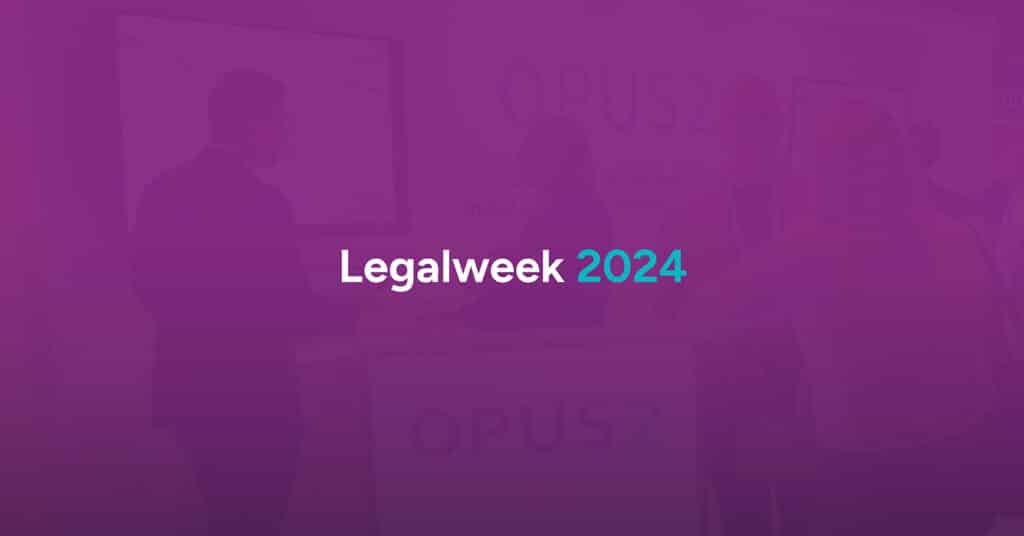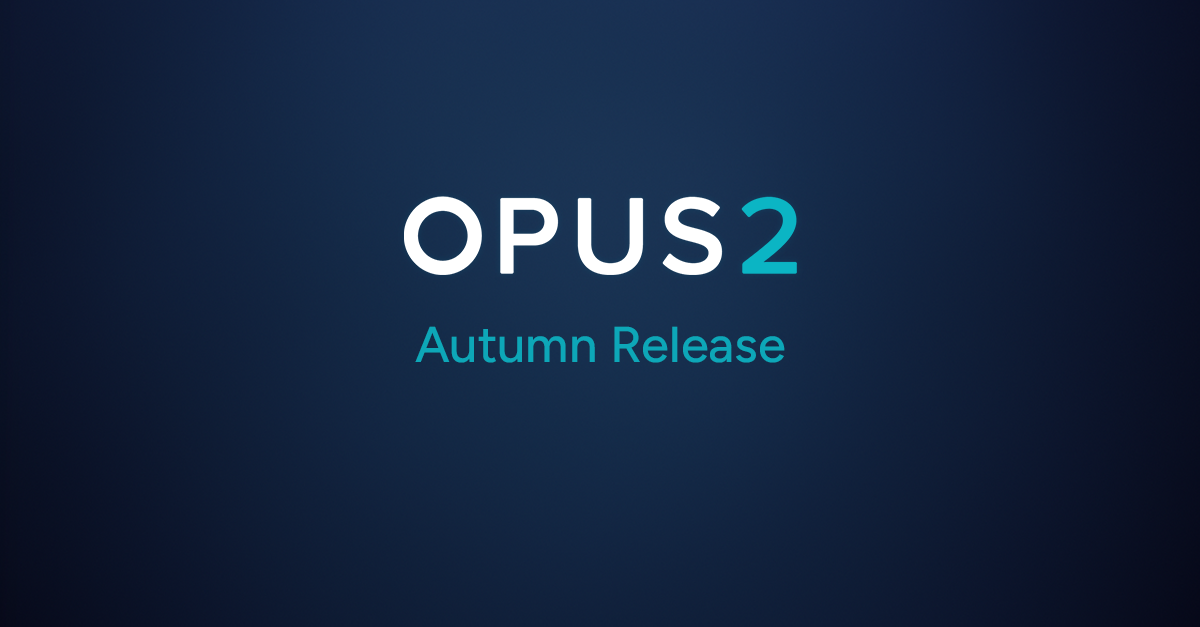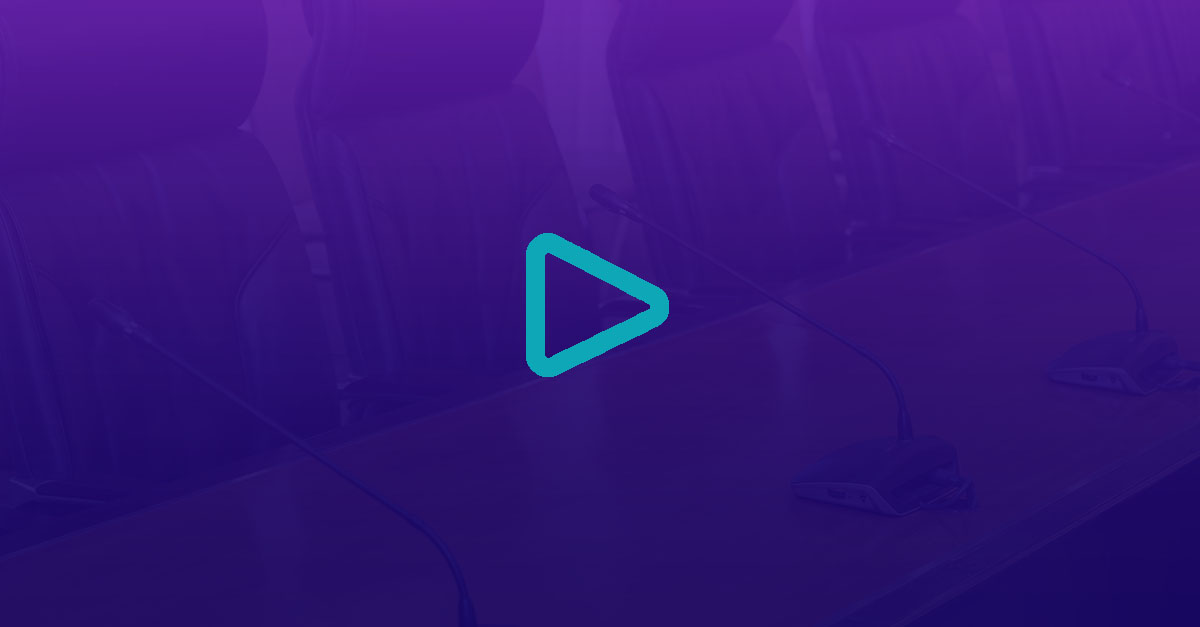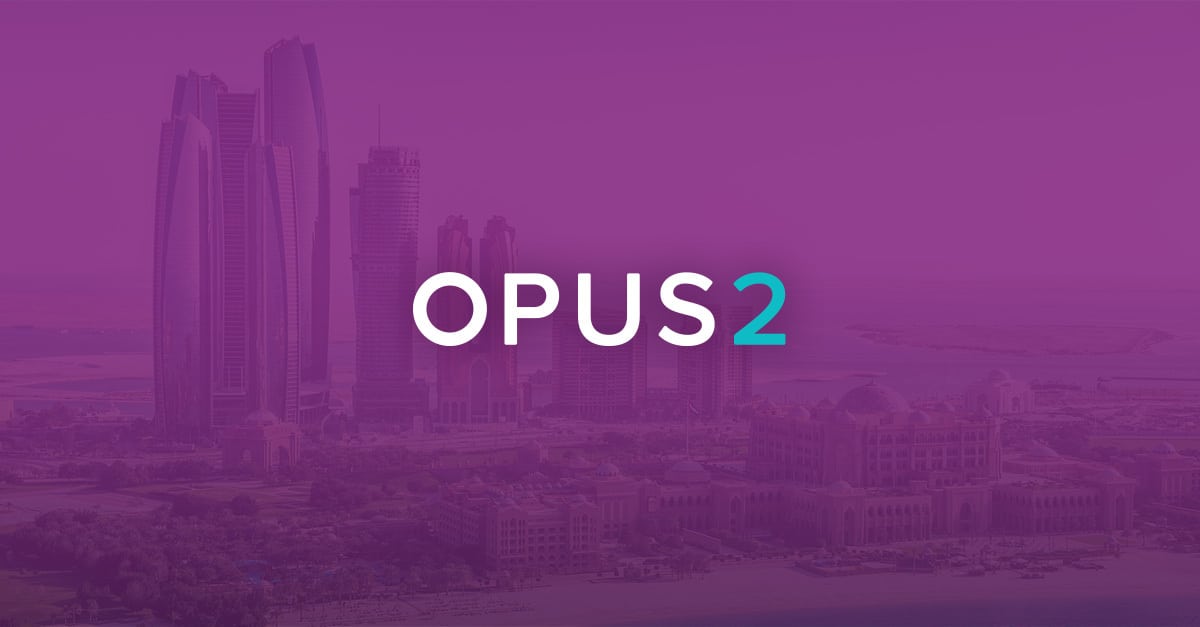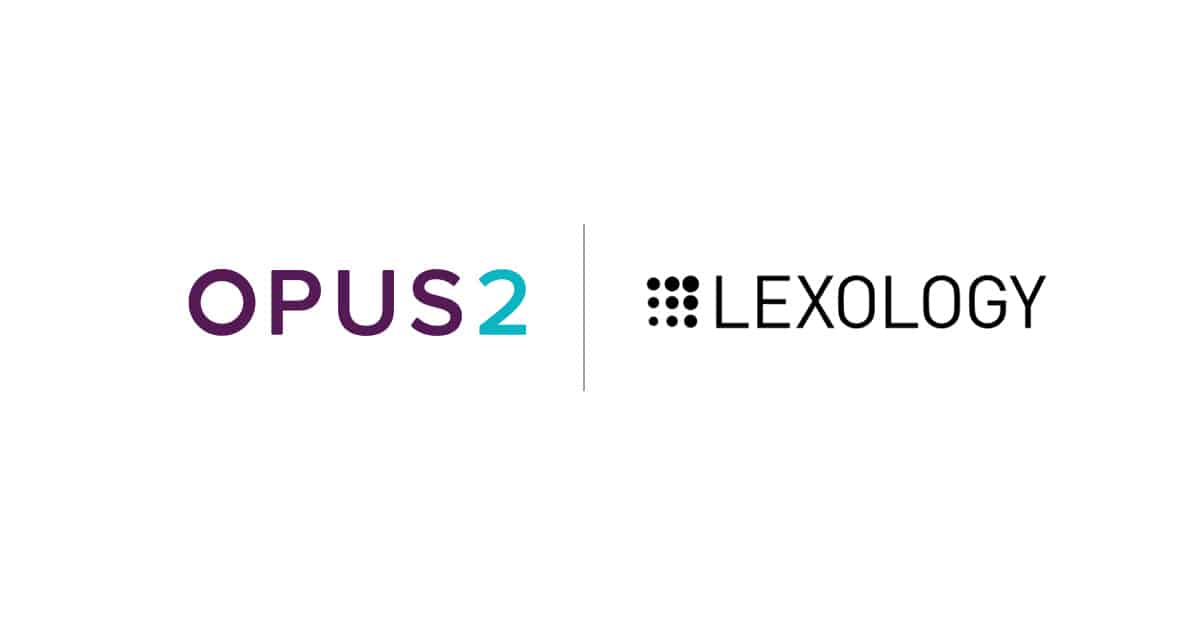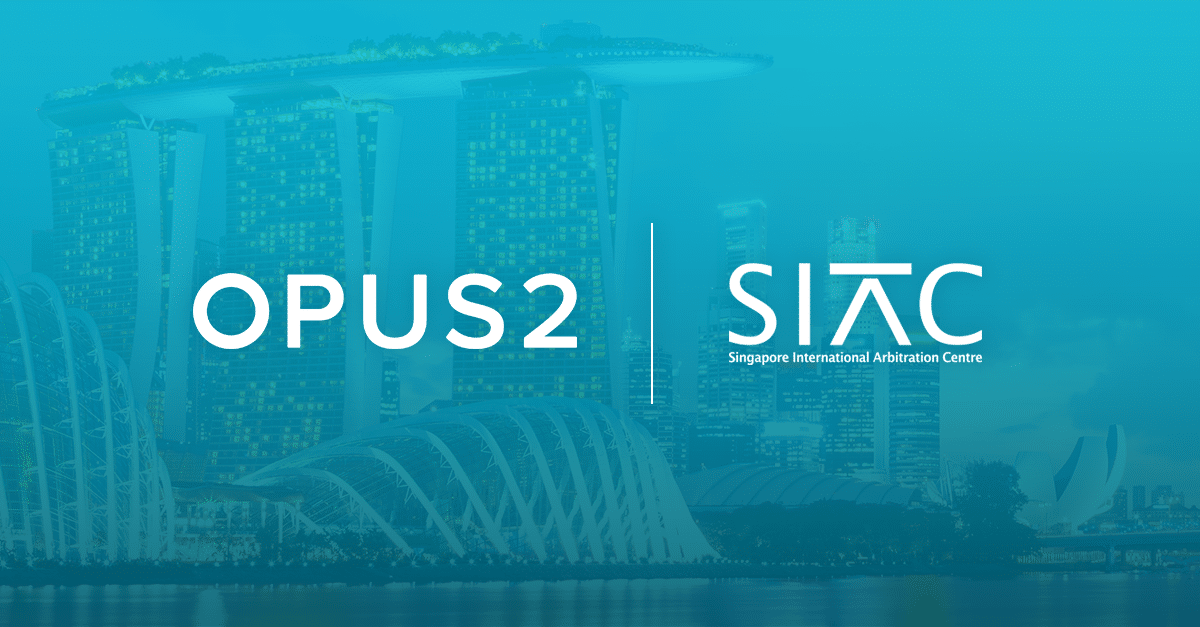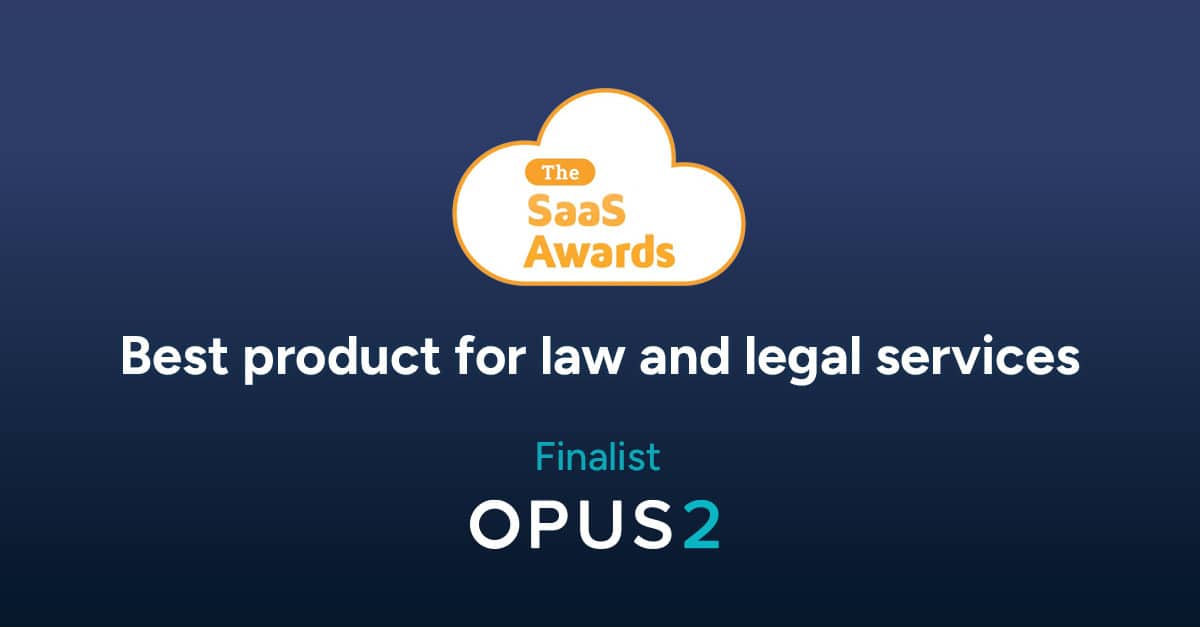We’re already gearing up for Legalweek 2025. Stay tuned and subscribe to the Opus 2 newsletter to be the first to see the latest updates and our agenda for Legalweek 2025 in New York. Or, read on for a refresher of last year’s most important LegalWeek takeaways.
Every time we attend Legalweek, we have a unique opportunity to tap into the collective knowledge of hundreds of legal professionals. This year at Legalweek 2024 we talked with peers in a wide variety of roles, from litigation support professionals and lawyers to partners and heads of innovation. Throughout the sessions and discussions, we started to notice a few common themes, interesting trends, and helpful insights.
Here’s the best of what we learned.
Top 8 take aways from Legalweek 2024
1. Law firms that take a value-based approach to technology lead innovation
In my conversations at Legalweek, it became clear that most leading firms don’t approach innovation with the goal of buying whatever solution is new and trending. Instead, these firms invest in developing a deep understanding of the day-to-day needs of their lawyers and support staff. Then, they adopt new solutions that can meet those needs, deliver more value to their clients, and set them apart from other law firms.
These firms stay on the cutting edge because they make smart investments and routinely phase out anything that no longer delivers value. When they have a challenge to solve, they begin by looking at the technology the firm already has. They define why each software investment was made, assess whether the technology still serves that purpose, and decide if the tool can be applied creatively to solve the new challenge. If yes, they aim to maximize the firm’s technology ROI by developing additional use cases and improving adoption. If not, they carefully consider a new solution to meet the need.
The other thing that sets these firms apart is their understanding that technology isn’t always the answer. Sometimes innovation is about a shift in processes and the utilization of resources or creating a new role dedicated to enabling users to get more value from the firm’s solutions. At the end of the day, innovation is a compelling solution offering when delivered along with high-value legal services.
Liza Pestillos-Ocat
Senior vice president, head of operations
2. Tech stacks are expanding but a big-picture view is elusive
AmLaw 100 firms have largely embraced software as a service (SaaS) legal tech, and they routinely add new tools to their stack. For example, one attendee I talked with at Legalweek works in a large firm with more than 1000 attorneys. They shared that the firm currently uses and manages 400 different applications. And chances are good that they’ll increase that number year over year. Firms will continue adopting new technology to operate, serve clients, and scale. At the same time, they also need to be able to use information from a combination of solutions to see the big picture – which can be a challenge.
For innovative, tech-forward firms it’s important to build a legal tech stack thoughtfully and maintain a framework that enables useful connections between systems. From paralegals to partners, end users need to be able to access information from various systems and view it together in reports and dashboards. The attendee that I talked to shared that they’re currently building dashboards in Microsoft with aggregated, real-time data visualizations of various tasks, activities, notifications, data tiles, project info, and so on. This solution leverages the APIs in their SaaS applications to create dashboards customized by use case. While this approach may be time-consuming to build out, it will be highly impactful.
Ultimately, focusing on user experience and interconnectivity will be essential for firms to get the most value possible out of their legal tech stack as they grow.
Josh Newton
Account executive
3. Firms want their legal tech to improve client engagement
We connected with a lot of our customers during our time at Legalweek and many were eager to find new ways to use technology to streamline client engagement and collaboration. Naturally, a firm’s relationships are built on a foundation of personal interactions, but the legal teams we talked to are looking to use technology to enhance client engagement.
Specifically, we saw interest in the use of information portals in litigation for law firm clients. These client portals empower your team to deliver and receive case-related documents securely while also providing insights and progress updates. Additionally, these portals can be used to collaborate with expert witnesses and co-counsel as needed. Overall, they can deliver a tremendous amount of value.
We also explored how law firms can leverage the Opus 2 platform as an illustrative tool for client presentations – an approach that certainly makes a lasting impression.
Chris Finley
Solution consultant
4. Despite the AI buzz, firms still need day-to-day solutions
The chatter at Legalweek certainly confirms that AI is still a hot topic. However, most current AI applications don’t address the day-to-day administrative work law firms need to complete. In fact, in many cases, it adds new tasks and workflows that require human input to complete.
When considering technology, firms should focus on investing in foundational tools that address the most time-consuming, manual tasks before adding AI to their workflows. For litigation teams, this means adopting software that helps with preparing virtual binders, stamping exhibits, relating designations, and clipping deposition video. These are time-consuming, repetitive, and tedious tasks that can take hours instead of days with the right case management software.
Rachel Bailey
Product marketing manager
5. Law firms aren’t taking full advantage of adoption experts
Change is hard. And we all know that lawyers can be particularly set in their ways. So, technology adoption is a real challenge, and law firms are looking for help. As I talked with attendees who were struggling with this, I noticed that many of them didn’t have a clear strategy to promote their products and solutions to attorneys and staff.
I was surprised to hear this because legal tech companies, including Opus 2, are full of technology experts, solutions consultants, and customer success professionals who can help. In fact, many of them come from a legal background and understand the nuance of legal organizations. Sadly, it seems that many law firms aren’t tapping into these resources.
Software teams have endless experience navigating and overcoming barriers to adoption. They can collaborate with you to build a proactive change management plan that is customized to meet the unique needs of your firm. Additionally, they can provide customized promotional resources, curated training materials, and ongoing support.
Having a plan and a software partner that’s invested in your success will make all the difference as you build a culture of technology adoption.
Traci Hewitt
Client relationship manager
6. There are lots of differing definitions of case management
As I chatted with attendees, I noticed that many of them had different definitions of what case management means. Ask 10 people, and you’ll get 10 different answers. It all depended on who I was talking to and what role they play in the process. Litigation support professionals, paralegals, associates, and partners may all define case management differently.
These assorted definitions make sense when we consider the different parts of the process each role is responsible for and the variety of point solutions they may use to accomplish their work. Point solutions that consider themselves case management tools may help with case chronology, electronic bundling, transcript management, or some other workflow – but they rarely address more than one litigation use case effectively.
This means that firms must invest in multiple tools, navigate different systems to access information, and manually manage processes. It can quickly become an organizational nightmare – which is why a platform that can do it all (like Opus 2 Case Management) is so valuable.
Gary Schaye
Senior account executive
7. Lawyer tech adoption is still a challenge
At almost every legal event we attend, we hear the same thing – getting lawyers to use new software is an uphill battle. Regardless of what solution you’re adding to your legal tech stack, you’re bound to get a tepid response from a handful of lawyers. The key to overcoming resistance? Proactive planning and persistence.
Here are a couple of ways our clients win buy-in from their team:
- Ignite their competitive spirit by sharing success stories from notable firms.
- Promote how the software can be customized to reduce disruption to their processes and personalized to meet their individual needs.
- Empower litigation support to track logins and usage to identify power users and champions.
- Make training more manageable with mini-workshops focused on how the tool simplifies the tedious processes that cause recurring frustrations.
- Give them a head start by proactively creating a new workspace for matters that may go to trial.
Jill Goldstein
Senior account executive
8. Users want to shift to the cloud, but law firm buy-in is slow
Many tech-savvy lawyers and staff are eager to make the move from legacy on-premise solutions to the cloud. They understand the value that cloud-native solutions deliver including real-time global collaboration, on-demand scalability, intuitive client information portals, routine system updates without downtime, easier sign-in processes, lower IT staffing costs, and more. But it seems some law firms aren’t quite ready yet.
Several attendees I talked with expressed frustration with their firms’ hesitation to move to the cloud. Despite having a solid reputation for being highly secure, customizable, and reliable, some firms still avoid cloud-based legal tech solutions. This preference is likely rooted in the desire to maintain full control over all network hardware and software as well as lingering security concerns. This wariness of proven cloud-based solutions illustrated an interesting juxtaposition when considering the industry’s enthusiasm for relatively new technology like generative AI.
In the end, law firms have to carefully consider the solution that’s right for their needs and their clients. But, the benefits of the cloud for both software providers and law firms are sure to overcome lingering objections in short order.
Kim Bookout
Senior solution consultant
9. Features designed without a user focus – all flash and little function?
No recap of this year’s Legalweek would be complete without a mention of AI. It was everywhere, from sessions to the exhibit hall. It’s clear that many of the legal tech companies at Legalweek now offer solutions or features that rely on Large Language Models (LLM), typically via OpenAI’s suite of generative AI models. These companies are easy to spot as you walk the floor because their booths and messaging are now centered around AI buzzwords. And as a marketing tactic, it works – but does their AI?
It’s a question worth considering as law firms invest in new technology, navigate emerging AI regulations, and address user and client concerns. Certainly, the power and promise of AI are real, but only when solutions are designed thoughtfully, with an unwavering focus on the user’s needs.
When it comes to AI, the “how” of it all matters – a lot. How can AI be incorporated to improve existing processes rather than create barriers? How will lawyers maintain control of the resulting work product? How can AI be applied to be fully integrated, intuitive, and easy to use? How will it deliver meaningful, long-term value? When software companies take the time to ask these questions and answer as an advocate for their users the result is more than a marketing gimmick – it’s genuine innovation.
Reinald Westerhuis
Solution consultant
